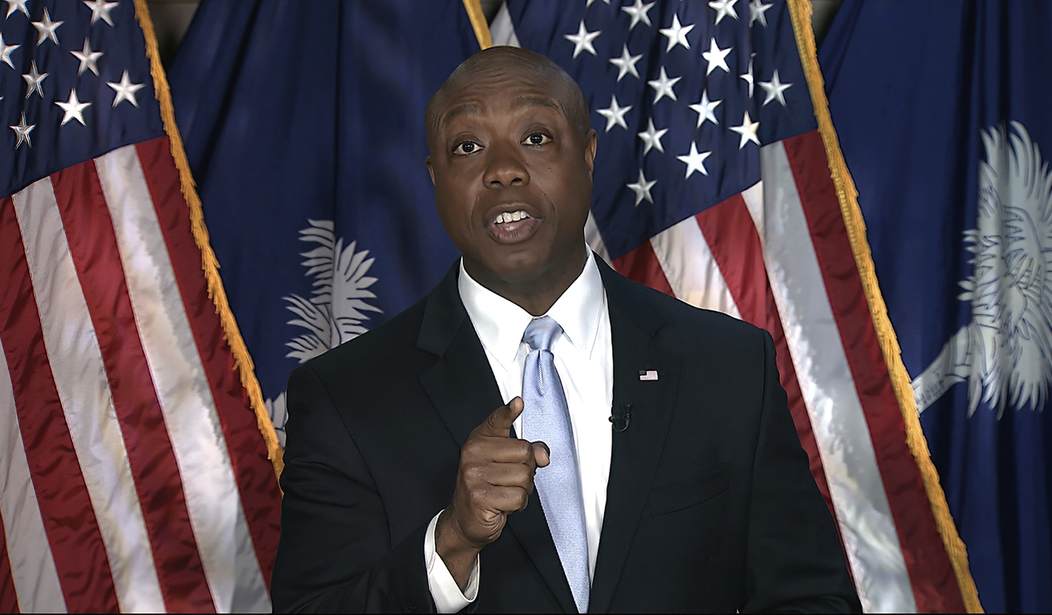In theory, Tim Scott would make a compelling candidate in the 2024 Republican presidential primary. For the people whose opinions matter most at this stage — deep-pocketed donors — the idea goes beyond a hypothetical. Politico reports that major donors have begun showering the Republican senator from South Carolina with both attention and cash:
Ellison’s remote Lanai Island home was well out of the South Carolina senator’s way. But for Scott, who like the 76-year-old Ellison is an outspoken advocate for school choice, cultivating the mogul has paid dividends — and could even help propel a 2024 presidential bid. Since last October, Ellison has contributed $10 million to an outside group aligned with the senator — a huge sum even in the super PAC era and the business owner’s biggest known contribution in three decades as a political donor.
Scott’s behind-the-scenes courtship of Ellison illustrates how the senator has quietly become a powerhouse fundraiser and a major force within the Republican Party. Scott, the only Black Republican in the Senate, has seen his profile rise since delivering the party’s response to President Joe Biden’s joint address to Congress in April and is developing a vast network of small- and large-dollar donors that spans his party’s ideological spectrum, helping him far outraise Senate colleagues this year.
Perhaps more importantly, Scott has built credibility across the conservative-MAGA divide in the GOP:
The pro-Scott super PAC, Opportunity Matters Fund, has drawn support from conservative donors like Richard Gaby, who has bankrolled the likes of former President Donald Trump and Georgia Rep. Marjorie Taylor Greene. But Scott has also received backing from the party’s mainstream givers, like New York hedge fund manager Dan Loeb, a financier of gay rights initiatives who is slated to host a fundraiser bolstering Scott later this year.
With the top levels of the GOP divided over whether to remain in lockstep with Trump or break away from him, senior Republicans say Scott’s ability to win support from divergent wings of the party could be an asset should he wage a 2024 run.
Theoretically speaking again, this is the same space that Ron DeSantis hopes to occupy, as well as Greg Abbott if he decides to give it a go. Both DeSantis and Abbott have the virtue of being outsiders to Washington (although DeSantis held a House seat for three terms too). However, they also have the handicap of having to actually govern, and that involves choices that can eventually alienate members of the various cliques. As a member of the Senate, Scott may have an advantage in avoiding that problem.
Politico notes the other advantage that Scott has, mainly through default. For some reason, the GOP seems a lot more interested in debating masks and vaccines rather than school choice when the latter is practically being gift-wrapped for Republicans by Randi Weingarten and the critical-race theory crowd. The closing of public schools has had a deeply regressive impact on both parents and children of low-income households, especially in urban and first-ring school districts. Wealthier parents have access to private education for their children — just ask Gavin Newsom — while for the past year other children haven’t been educated much at all. Scott’s focus on this could deliver not just more donors, but also renewed openness to the GOP among communities that Republicans have long ignored and vice versa.
That could be the reason that Scott’s fundraising is broader than just a few bored tech titans:
Scott’s support isn’t just coming from big donors. He is also developing a formidable small dollar network and raking in cash from online contributors across the country. So far this year, Scott’s campaign committee — which unlike the super PAC can only accept donations of up to $5,900 — has raised $11.7 million, more than any incumbent from either party up for reelection next year. During the second quarter, which ended June 30, Scott amassed $9.6 million, more than doubling the total of Rubio, the next-highest Republican incumbent running in 2022.
Scott does have to win his re-election campaign first. Perhaps the fundraising here is entirely in service to the near-term goal. However, no one thinks Scott is at much risk in next year’s midterms, especially if it shapes up as a referendum on Joe Biden’s performance — which is all but certain. If he’s building a large-scale fundraising effort, Scott has to be looking past 2022 at least in part. But even if Scott isn’t looking past 2022, major donors clearly are.








Join the conversation as a VIP Member